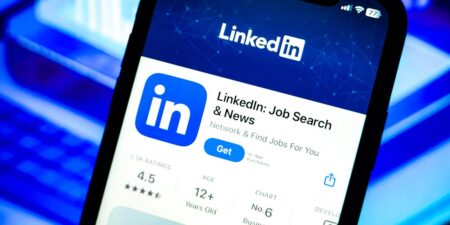This as-told-to essay is based on a transcribed conversation with Jay Jung, 28, a software engineer from San Francisco, about landing jobs in Big Tech. The following has been edited for length and clarity.
During college, I found it hard to get internships.
Since then, I’ve built my career as a software engineer at Amazon, Microsoft, Meta, and other ventures and projects.
I initially studied industrial design and pivoted to computer science roughly two years into my time at Georgia Tech. I only started learning to code in my junior year, and it felt like my peers were so ahead.
The barrier to entry in tech is high. Some people have been coding and building things since high school. It felt like my résumé wasn’t up to par.
These are my top tips for preparing your résumé, getting referrals, and succeeding at interviews in Big Tech.
To break into tech, I had to revamp my résumé
To get my first opportunity in tech, I looked for opportunities for early career students or people who may not have a lot of coding experience.
I came across a hackathon with JP Morgan called “Code for Good,” where students can showcase their skills.
Before applying in October 2017, I decided to revamp my résumé, which at the time included irrelevant experience in tutoring and serving. I learned from a Unity tutorial about building a 3D game, so I could say I built a game from scratch using 3D algorithms. Having this end-to-end project on my résumé was hugely helpful, and I got accepted to the hackathon.
After that, I landed an internship at Amazon, where I got my first full-time role within AWS in 2019. I suspect having the JP Morgan name on my résumé helped me pass certain filters companies have regarding experience.
I had more than 10 people look at my résumé. It was too many.
If you don’t know whether your résumé is decent, get some peer feedback. Even having one friend look at it can remove some bias you have toward it.
I asked a lot of people to look at mine, including recruiters I reached out to on LinkedIn. Many recruiters were open to it, both on a paid and free basis. By the 10th person, I noticed discrepancies. Someone would ask me to take something out, and the next person would suggest putting it back in.
Having five to seven people review your résumé is the sweet spot. There are better ways to spend your time, like improving your hard skills as an engineer, than making small subjective tweaks from a 10th perspective.
Résumés are the front page of a book that hooks the recruiter. But the rest of the book is dependant on your skillset.
Referrals are a golden ticket
Early in my career, I was always open to new opportunities for career growth. In 2021, while at Microsoft, I landed a job at Meta through a referral.
I saw a Meta manager post on LinkedIn that he was hiring for his team. I reached out, and he asked to chat for 10 minutes. Beforehand, I’d done extensive research on what his team does. I knew he worked on the API team, so I told him that I’d read the API design docs for Facebook and thought they were really interesting. He thought it was cool and asked me to tell him about it.
Even doing 20 minutes of preliminary research into what the hiring manager’s team does can pay dividends in the future.
At that time, my résumé showcased projects I’d worked on, and I had a few years of experience at Microsoft and Amazon, which probably helped, too. If your résumé has enough technical fundamentals on it, and you can talk about those things, it can demonstrate to managers that you’d be able to pass a coding interview.
After the call, the manager gave me a referral, which kicked off the process of me joining that team.
Some Big Tech companies give the referrer money if the person they refer ends up joining the company, so there’s a huge incentive for them to do it. If your résumé is good enough and you can showcase that you can pass the interview, they might do it to earn a lump sum.
Talk through your logic when asked a coding question in an interview
In technical interviews, you’re typically set coding questions — technical puzzles that you’re asked to work through. Passing those problems by having a working solution will always be a key factor in getting a Big Tech job.
You can practice coding questions on places like LeetCode. It’s a battle of perseverance and time to try to cover them. Earlier in my career, I’d immerse myself in coding, spending 12 to 14 hours a day on LeetCode to prep for interviews.
The biggest thing to know about coding questions is to treat them as conversations.
I’ve done interviews where I didn’t do that well on the coding question, but I talked through all my thoughts. I also leveraged the interviewer, saying, “I think this is my approach, what do you think?”
When I worked as an individual contributor at Amazon and Facebook, I interviewed job candidates. After the interviews, when giving feedback about candidates, a key factor I’d consider was whether the candidate talked through their solution out loud. It indicated that if they joined the team, they’d be able to have conversations about features we were building.
If one candidate spoke really well and could do most of the coding problem, and another candidate had a perfect answer to the coding problem, but didn’t talk well, my peer interviewees and I would usually prefer the first candidate.
Do you have a story to share about getting into Big Tech? Contact this reporter at [email protected].
Read the full article here
















